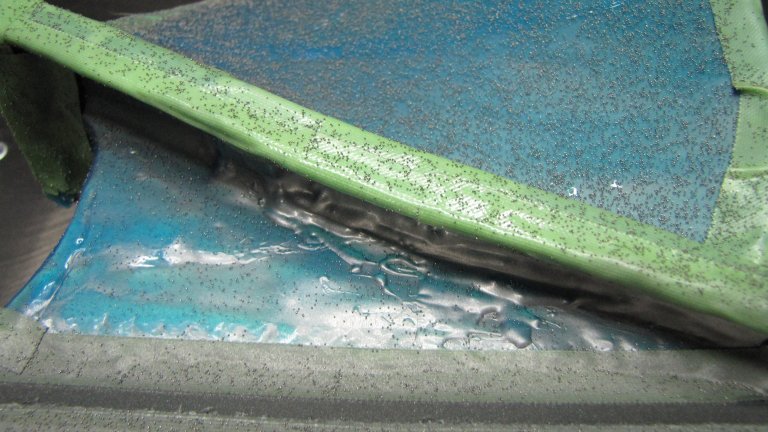
More Time-Efficient Engine Repairs
Thermal coating is a traditional procedure that is being used, among other things, for the surface finishing of components in the aviation industry. This is why the company MTU Maintenance Berlin-Brandenburg GmbH in Ludwigsfelde uses it across the board – or rather “across all surfaces” – for repairs of engines and industrial gas turbines of its predominantly international clients.
The cooperation with the department “Polymer Processing/Mechanical Testing” of the Technical University of Berlin led to the discovery and testing of a polymer-based liquid agent. This agent is not only suited for thermal coating, but even for upstream and downstream processes and it is already being used in the field.
Mathias Deutschmann, responsible for the area of repair development at the MTU in Ludwigsfelde, describes the core activity within his work area as follows: “Automation that respects individuality”. MTU analyses, services and repairs up to 500 engines on a yearly basis, but there are numerous different versions and extension levels that arrive at the plant with a vast spectrum of different kinds of damages. They usually come from the world-wide leading engine manufacturers Pratt & Whitney and General Electric. In addition to engines the company from Ludwigsfelde also services so-called derivates, which are variants of approved aircraft turbines that are used in a modified version in power plants and on ships.
It’s all in the masking
An important work stage during the repair of engine components is thermal coating. Mathias Deutschmann points out that, just as painters in houses cover surfaces that are not to be painted on, the masking of undamaged components is “half the battle”. In order to avoid the cumbersome process of removing the sprayed-on material – metal, ceramics, synthetic materials or a combination of all of those – masking paint is applied with great precision by hand. But the usual bit-by-bit application of the masking paint is often time-consuming and may take as long as five hours per component. Consequently, MTU Maintenance realised that there was a great potential for saving time and expenses. The time had come to find a new masking paint!
The sought-after agent had to meet complex requirements: it would have to provide a clear cover for parts with a complicated 3-D structure or wave shape and it should “get along just fine” with highly sensitive materials, such as titanium or other masking agents.
Technical University of Berlin brings chemical expertise to the table
In the framework of the funding programme “Extensive Guideline Research and Development” (“Große Richtlinie Forschung und Entwicklung“) that is being financed by the European Regional Development Fund and the state of Brandenburg, MTU was able to take a closer investigative look at the topic of “masking”. Thanks to a student research project the business got in touch with the Technical University of Berlin. Scientists and students of the department “Polymer Processing/Mechanical Testing” then conducted chemical analyses of different solid materials approved for use for masking purposes in the aviation industry. What are they made of? What about their temperature index and gel time?
At the end, the predefined ideal characteristics have been discovered in a liquid agent that does not corrode the components and that hardens extremely rapidly at elevated temperatures and at room temperature. A diligent screening of the market yielded the desired results: after numerous joint test series, the partners identified a polymer-based liquid masking agent, which is in use at MTU by now.
For Mathias Deutschmann the cooperation was a success: “Without the Technical University we would have lacked the technological and analytical tools to conduct the studies. Furthermore, the University brought fundamental chemical expertise to the table, which lies outside of our core competencies.”